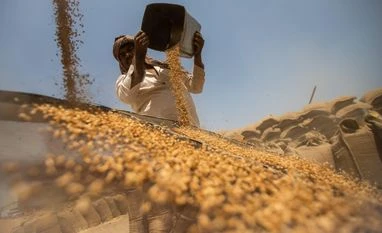By Ruchi Bhatia
The widespread cereal shortages in India could drive inflation higher in Asia’s third largest economy, even as the vegetable price shock is set to ease in the coming months, according to HSBC Holdings Plc.
“Although concerns about rising food prices are warranted, the real problem is not with tomatoes, but elsewhere,” economists Pranjul Bhandari and Aayushi Chaudhary wrote in a report. The worry on cereals, including rice and wheat, are “legitimate” and may push prices higher.
HSBC has retained its inflation forecast of 5 per cent for the year ending March 2024 but sees higher risks if cereal inflation takes off. “Rain distribution and rice sowing data over the next few weeks will be critical,” the economists said.
Tepid sowing in northwest India and insufficient rains in the south and the east could hurt the rice crop and slow shipments for the world’s largest rice exporter India, the economists said. This means there could be global price implications for wheat, which is a part-substitute for the food staple, they added.
Cereal prices in India could jump further after Russia warned vessels heading to Ukraine ports in the Black Sea would be seen as potential carriers of military equipment, which sent wheat futures soaring last week. El Nino could also push prices higher.
More From This Section
Cereals make up nearly 10 per cent of the consumer price index basket and are a staple in Indian diets. Surging food prices pushed retail inflation to a three-month high of 4.81 per cent in June, prompting economists to raise their price gains forecasts for the year and this may see the central bank hold rates for an extended period.
Containing price pressures is also crucial for Prime Minister Narendra Modi, who faces national elections next year. Last week, the nation banned exports of cheaper, non-basmati white rice to rein in domestic prices.
Weaker monsoon rains in some parts of India and floods in other areas contributed to soaring prices of vegetables and pulses. A jump of more than 400 per cent in the cost of tomatoes since the start of the year along with volatile prices of onions and potatoes — key ingredients in an Indian meal — stoked inflation pressures.
“Tomatoes are a short-cycle crop and price rises tend to reverse in two months,” the economists said. The hikes in prices of pulses, sugar and oilseeds were also potentially manageable, they added.
)